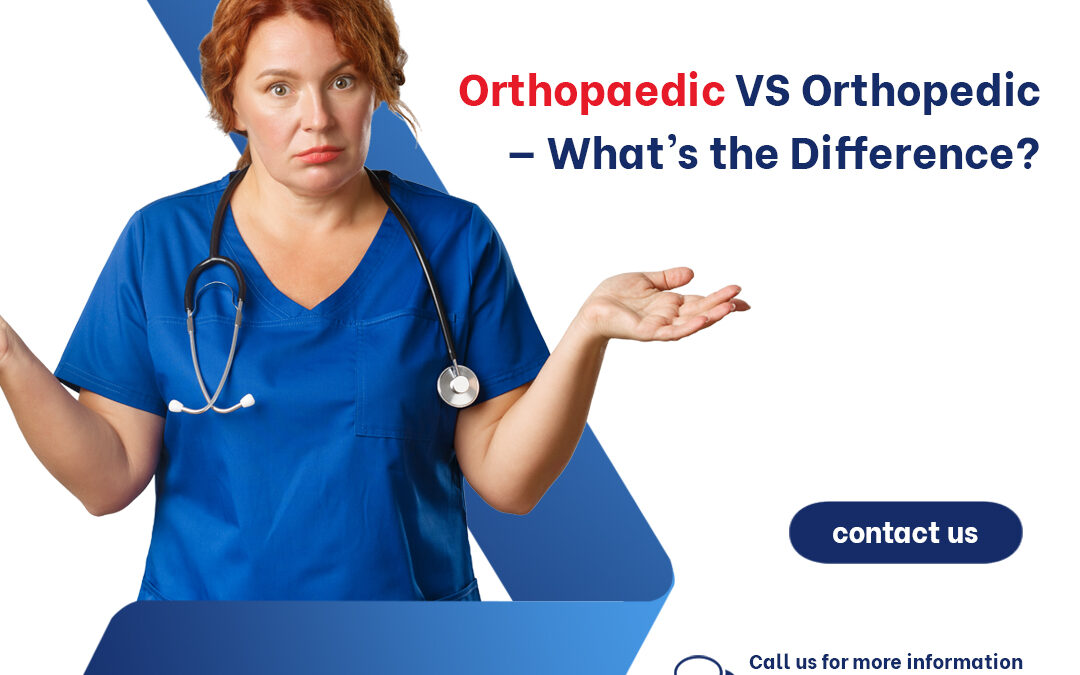If you’ve encountered the terms Orthopaedic and Orthopedic and wondered if there was a difference between the two, there’s a simple answer. These are simply two alternate, and correct, spellings for the same branch of medicine. While orthopedic is the more commonly used and accepted spelling, especially in American english, orthopaedic is the more traditional academic and British spelling.
The terms can be used interchangeably, but in most instances modern orthopedic surgeons will use the spelling without the “a.” However, many professional organizations such as the American Academy of Orthopaedic Surgeons (AAOS) still use the traditional spelling to signify a closer relationship to the academic roots of the field.
If you encounter either spelling, know you are dealing with the same branch of medicine that treats conditions and injuries affecting the musculoskeletal system.
To learn more about orthopedics, we invite you to read the following guide. You can also contact our caring team if you have any questions or want to learn more about orthopedic treatment options that can help you find relief.
A Quick History of Orthopaedic Surgery
The term orthopaedics is rooted in the greek words “ortho,” to straighten or correct, and “paidion,” the greek word for child. This means that orthopedics originally developed specifically to treat and correct physical injuries and deformities in children. In most cases, this did not involve surgery, but instead the use of corrective braces, exercises and manipulation.
Widely considered the “father of orthopaedic surgery,” British surgeon Hugh Owen Thomas developed many of the techniques that would lay the foundation for modern orthopedics in the late 19th century. This includes detecting, setting, resetting and splinting bone fractures.
Many now-common orthopedic procedures were developed relatively recently. For example, the first modern hip joint replacements were performed in the 1960s by British surgeon John Charnley after he discovered that damaged joint surfaces could be replaced with an artificial prosthesis cemented to the bone.
Modern Orthopedics — Defining this Branch of Medicine
Modern orthopedics has grown well beyond its original roots of treating injuries and deformities in children. It now encompasses an entire branch of medicine that deals with identifying and treating injuries and conditions affecting the entire musculoskeletal system. This can include everything from a simple muscle strain, to a broken bone to a degenerative spine condition to arthritis of the hip.
While orthopedic surgeons have come to be the primary type of physician that many associate with this field, orthopedics includes many types of physicians and medical professions. This includes physiatrists, rheumatologists and physical therapists. Different types of orthopedic surgeons and physicians often work together to form a multidisciplinary team.
What to Look for in an Orthopedic Surgeon
The right orthopedic surgeon for your needs depends on your specific diagnosis and your treatment goals. For example, patients diagnosed with arthritis of the hip or knee should seek out a surgeon who specializes in this condition and performs procedures including knee or hip replacements. In most cases, conservative treatments such as physical therapy or therapeutic injections should be fully explored before surgery becomes an option as well.
To become an orthopedic surgeon, a physician must have a degree from an accredited medical school, complete a surgical residency in orthopedics, and then preferably, a fellowship in their chosen area of sub-specialty and be licensed to practice in their state. Orthopedic surgeons can also receive certification from a professional board such as the AAOS and additionally, subspecialty societies, as a demonstration of their commitment to achieving the highest level of education and practice in their specific field.
Undergoing orthopedic surgery is a huge decision, so find an orthopedic surgeon who takes the time to explain your condition, procedures and the recovery process while answering any questions you have. He or she should also have a support staff who represents these values as well while working in a clinic that is clean, inviting and centered on the comfort and well-being of patients.
Experience the OJRCA Difference
Outpatient Joint Replacement Center of America (OJRCA) and AAOS board-certified orthopedic surgeon Philip Clifford, MD, are committed to delivering the highest level of care in this branch of medicine. At our state-of-the-art facilities, we can help you learn more about your condition and treatment options. We can help you get back to a healthy, active lifestyle and better quality of life on the most cost-effective basis with a highly individualized care plan.
For more than two decades, Dr. Clifford, or Dr. Flip to his patients and team, has been helping patients dealing with chronic joint pain find lasting relief. No matter where you are in your treatment journey, we can help you get the orthopedic care you deserve.
To learn more, reach out to us today online or call us at (813) 492-4412.


